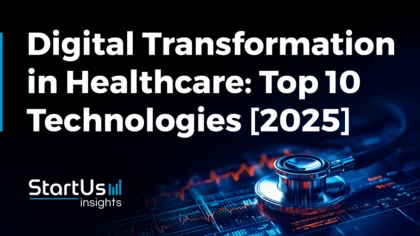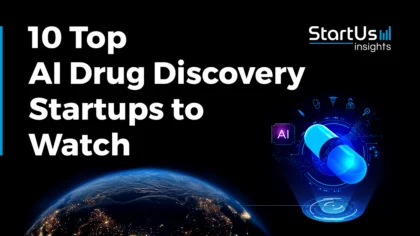The future of AI in healthcare industry is proving to be promising as artificial intelligence (AI) improves patient care and operational efficiency. For instance, advanced diagnostics algorithms detect diseases with accuracy, while AI-assisted robotic surgeries improve precision and reduce recovery times. In drug discovery, AI accelerates the identification of potential treatments and shortens the development cycle.
As these innovations address immediate challenges in healthcare delivery and management, stakeholders are adapting to maintain competitiveness in this rapidly evolving landscape. The integration of AI technologies is improving the quality of care and optimizing resource allocation. This positions forward-thinking organizations at the forefront of the healthcare revolution.
Why should you read this report?
- Gain in-depth insights into the top 10 use cases of AI in healthcare.
- Learn about three practical use cases for each use case.
- Meet 10 innovative startups advancing these applications.
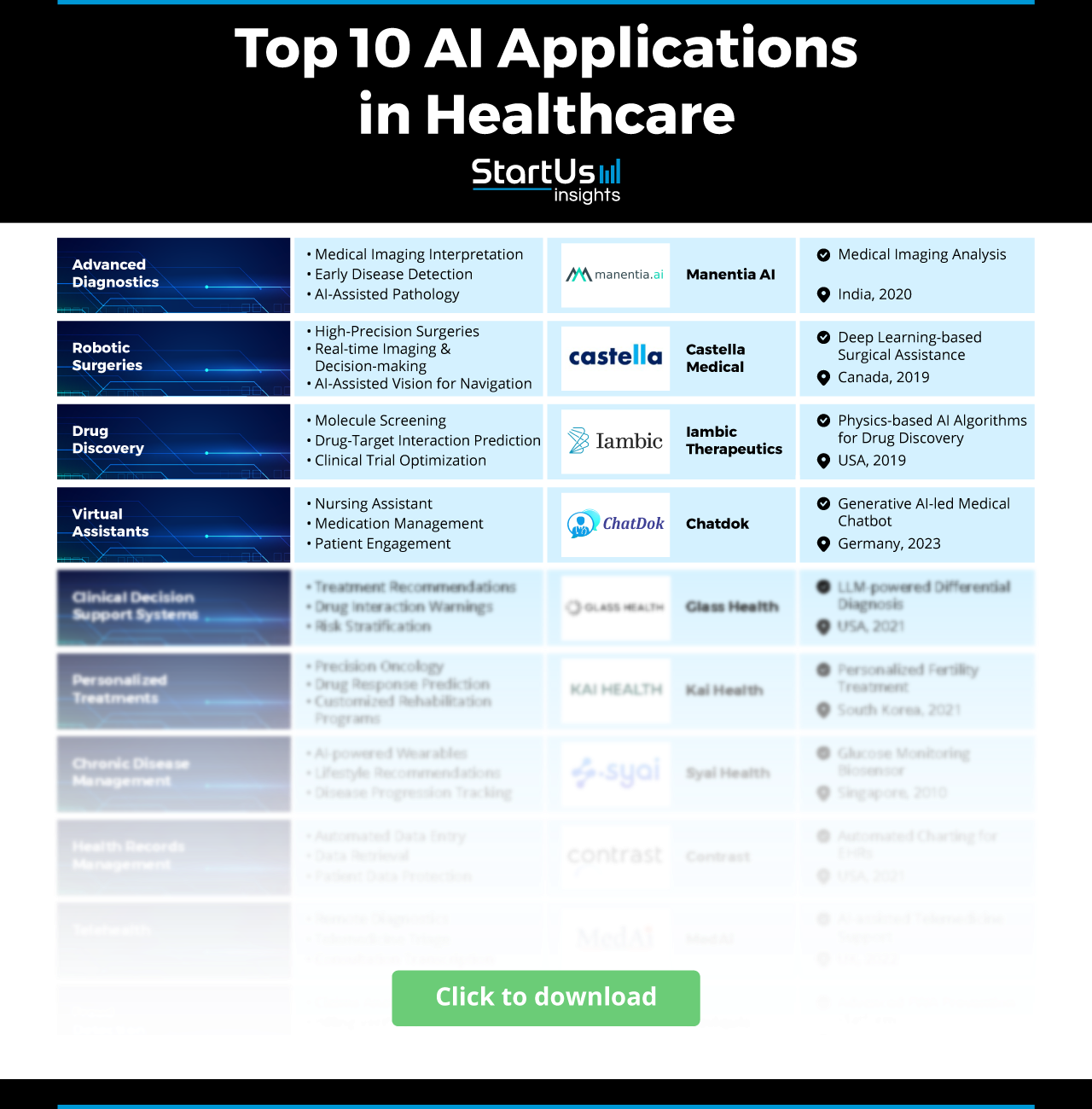
Key Takeaways
- Advanced Diagnostics
- Use Cases:
- Medical Imaging Interpretation
- Early Disease Detection
- AI-Assisted Pathology
- Startup to Watch: Manentia AI
- Use Cases:
- Robotic Surgeries
- Use Cases:
- High-Precision Surgeries
- Real-time Imaging & Decision-making
- AI-Assisted Vision for Navigation
- Startup to Watch: Castella Medical
- Use Cases:
- Drug Discovery
- Use Cases:
- Molecule Screening
- Drug-Target Interaction Prediction
- Clinical Trial Optimization
- Startup to Watch: Iambic Therapeutics
- Use Cases:
- Virtual Assistants
- Use Cases:
- Nursing Assistant
- Medication Management
- Patient Engagement
- Startup to Watch: Chatdok
- Use Cases:
- Clinical Decision Support Systems
- Use Cases:
- Treatment Recommendations
- Drug Interaction Warnings
- Risk Stratification
- Startup to Watch: Glass Health
- Use Cases:
- Personalized Treatments
- Use Cases:
- Precision Oncology
- Drug Response Prediction
- Customized Rehabilitation Programs
- Startup to Watch: Kai Health
- Use Cases:
- Chronic Disease Management
- Use Cases:
- AI-powered Wearables
- Lifestyle Recommendations
- Disease Progression Tracking
- Startup to Watch: Syai Health
- Use Cases:
- Health Records Management
- Use Cases:
- Automated Data Entry
- Data Retrieval
- Patient Data Protection
- Startup to Watch: Contrast
- Use Cases:
- Telehealth
- Use Cases:
- Remote Diagnostics
- Telemedicine Triage
- Consultation Transcription
- Startup to Watch: MedAi
- Use Cases:
- Fraud Detection
- Use Cases:
- Claims Analysis
- Billing Verification
- Transaction Monitoring
- Startup to Watch: Naviquis
- Use Cases:
FAQs: Applications of AI in Healthcare
1. How is AI used in healthcare?
AI plays a central role across multiple healthcare applications. It improves diagnostic capabilities by analyzing medical images, interpreting lab results, and identifying patterns in large datasets. AI systems also analyze real-time data from wearables and remote devices to flag early signs of deterioration. Predictive analytics further supports clinical decision-making by suggesting the best course of treatment.
2. What are the challenges of integrating AI in healthcare?
Despite its benefits, AI faces several challenges in healthcare, particularly around data privacy, security, and ethical concerns. The integration of AI systems requires high-quality, standardized data, which remains a barrier due to the fragmentation of healthcare systems.
Additionally, bias in AI algorithms stemming from incomplete or imbalanced data results in unequal treatment outcomes for certain populations. There are also regulatory and legal challenges around the liability of AI-driven decisions, as well as resistance from healthcare professionals who may be wary of relying on AI for critical tasks.
Where is this Data from?
StartUs Insights provides data through its comprehensive Discovery Platform, which covers 4.7+ million startups, scaleups, and tech companies globally, as well as 20K+ emerging technologies & trends. The platform excels in startup and technology scouting, trend intelligence, and patent searches, offering a detailed view of the innovation landscape. For this report, we analyzed technologies within specific industries using the trend intelligence feature. During this research, we identified patterns and trends, pinpointing relevant use cases and the startups developing solutions for each. More capabilities and details are available at StartUs Insights Discovery Platform.
Top 10 Applications of AI in Healthcare [2025 & Beyond]
1. Advanced Diagnostics
AI accelerates the early detection of diseases, like cancer and diabetes, by analyzing patient records. In pathology, AI automates the analysis process and makes it error-free by eliminating human intervention. Additionally, it analyzes digital pathology slides and identifies patterns at the cellular level quickly. The algorithms based on deep learning analyze images, like MRI, CT scans, X-rays, and ultrasounds, faster and more accurately in medical imaging. Radiologists thus use AI to speed up abnormality detection and improve diagnostics precision. This provides clinical decision support and reduces the need for repeat tests.
Dive Deeper:
- Noteworthy Example: Tempus builds solutions that generate actionable insights from radiology images to help providers make more informed diagnostic and treatment decisions.
- Financial Landscape: The average funding for startups using AI for advanced medical diagnostics is USD 10.9 million.
Startup to Watch: Manentia AI
Indian startup Manentia AI integrates artificial intelligence with radiology to improve cancer care. The company’s chest X-ray analysis solution, mXR, uses AI for anomaly detection and localization. Another product mCT uses a deep learning system to diagnose and manage chest X-ray findings, particularly in identifying and characterizing nodule mass cavities. Both products feature multi-finding detection, AI-powered accuracy, and flexible integration options. These products are used by radiologists and clinicians to improve diagnostic precision and gain in-depth insights to clinicians.
2. Robotic Surgeries
AI-powered robotics improve the precision, safety, and real-time decision support through machine learning, computer vision, and predictive analysis in surgeries. It assists in planning and executing surgeries by highlighting critical anatomical structures to avoid complications. For complex surgeries like neurosurgery, AI enables minimally invasive and high-precision surgeries by analyzing vast data, predicting surgical steps, and improving accuracy to the millimeter.
Real-time imaging and decision support systems improve surgical precision by combining imaging data with an augmented view of the patient’s anatomy. It also improves complex anatomical pathways and allows precise movement in confined areas for automating tasks like suturing. These technologies lead to reduced recovery times, fewer complications, and overall improved outcomes for patients.
Dive Deeper:
- Noteworthy Example: Intuitive‘s da Vinci surgical robots incorporate AI technologies to enable surgeons to study their own procedure data and adapt approaches for better patient outcomes. Their Case Insights tool uses AI to find correlations between surgical technique, patient populations and outcomes. Intuitive is also using AI for pre-operative 3D modeling and segmentation of CT scans to help surgeons prepare for procedures.
- Financial Landscape: The average funding for startups using AI for robotics surgery is 13.4 million.
Startup to Watch: Castella Medical
Canadian startup Castella Medical provides 4Sight Surgery, an edge communication platform that uses AI-powered decision-making for video-based medical procedures. This platform uses deep learning to facilitate real-time image recognition. This optimizes live clinical decision-making during video-based surgical procedures, such as endoscopy, laparoscopy, and robotic surgery.
4SightSurgery improves the precision and outcomes of surgical interventions along with improving the surgeon’s experience and reducing the cost of the process. Castella Medical’s platform thus improves population health by targeting epidemiological footprints. It further optimizes patient experience and improves clinical outcomes.
3. Drug Discovery
AI algorithms explore large chemical spaces and predict compounds with desired properties needed to bind with biological targets. It uses high-throughput screening (HTS) to improve the selection process for compounds that warrant further study and reduce the number of failed trials. The algorithms also perform visual molecule screening by simulating how molecules interact with specific biological targets.
Additionally, researchers study patient electronic health records (EHRs) and identify the most suitable candidates using AI. The method employs deep learning for drug-target interactions and facilitates adaptive clinical trials, where data from ongoing studies is used to modify trial parameters. Technologies like machine learning are used to identify existing drugs that could be repurposed for new therapeutic applications.
Dive Deeper:
- Noteworthy Example: Exscientia is a pioneer in using AI for small-molecule drug design. The company reported the first AI-designed drug candidate to enter clinical trials in early 2020. Exscientia has expanded its AI-based platform to develop novel therapeutic antibodies through generative AI design and is collaborating with major pharmaceutical companies like Bristol-Myers Squibb, Sanofi, and GSK on drug discovery projects
- Financial Landscape: The average funding for startups using AI for drug discovery is 27.3 million.
Startup to Watch: Iambic Therapeutics
US-based startup Iambic Healthcare develops an AI experimental platform to optimize drug discovery. It converts molecular designs into biological insights and includes the following components. NeuralPLexer for protein-ligand structure prediction using 3D physics-based equivariant generative diffusion, OrbNet for AI-accelerated quantum chemistry with a graph neural network architecture, PropANE for multi-parameter lead selection, and Magnet for generative molecular design.
The platform refines target profiles with alternative ones based on its insights and designs drug candidates using de novo protein-ligand structures. It also provides cryptic pocket predictions, and synthesizes thousands of unique compounds nanoscale weekly. With these products, the company creates reliable and accurate models to explore the chemical space further.
4. Virtual Assistants
AI-powered virtual assistants educate patients, manage appointments, track symptoms, and facilitate communication with healthcare providers. They also improve medication adherence by sending reminders, tracking doses, predicting drug interactions, and ensuring timely refills. AI-powered virtual assistants also offer emotional support in mental health care.
The virtual assistants are trained to guide patients through breathing exercises, mindfulness meditation, and other relaxing techniques. Additionally, virtual assistants provide administrative support by handling routine tasks, which reduces the administrative workload on healthcare providers and staff. They improve workflows and minimize inefficiencies by automating appointment scheduling, medical record management, insurance, billing, and more.
Dive Deeper:
- Noteworthy Example: Buoy Health offers an intelligent symptom checker that uses AI to guide users to a possible diagnosis and recommendations for further action. It’s particularly marketed to employers as a way to save money by helping employees make informed decisions about when to seek medical care.
- Financial Landscape: The average funding for startups using AI-powered virtual assistants is USD 9.1 million.
Startup to Watch: Chatdok
German startup ChatDok offers personalized healthcare through a secure, generative AI-powered, physician-led medical chatbot. It features image analysis, video consultations, and physician-led, AI-supported chronic care for cardiovascular diseases and other chronic conditions. It also assists with symptom assessment, treatment options, mental health, nutrition, and more. Further, the chatbot provides access to doctors through online appointments and video visits. The chatbot is compliant with HIPAA and GDPE. ChatDok makes chronic disease management accessible, personalized, and proactive to everyone with this virtual assistant.
5. Clinical Decision Support Systems
By automating routine tasks and providing decision support, AI reduces stress and burnout among healthcare providers. Using AI algorithms, clinicians identify relevant information efficiently from the vast amount of data available on EHRs. The algorithms also continuously learn from these data to generate a pattern for future use. By analyzing patient data and treatment outcomes, AI suggests optimal treatment plans and drug combinations customized to individual patients. Such solutions also assist in interpreting medical images and other diagnostic tests. They also predict patient risks for various conditions and enable early interventions and preventive measures.
Dive Deeper:
- Noteworthy Example: IBM-Watson CDSS solution combines real-world drug and disease content, natural language processing, and cloud-based tools with the goal of streamlining clinical decision-making at the point-of-care.
- Financial Landscape: The average funding for startups using AI for clinical decision support systems is USD 11 million.
Startup to Watch: Glass Health
US-based startup Glass Health provides an AI-powered platform that assists healthcare professionals in developing differential diagnoses and drafting clinical plans. The platform analyzes patient summaries to suggest potential diagnoses for complex cases and generates evidence-based assessment and treatment plans. By combining a large language model (LLM) with peer-reviewed clinical guidance created by physicians, the platform identifies diagnoses that align with the patient’s presentation. Then it applies relevant clinical guidelines to draft personalized care plans for review. This process streamlines the diagnostic process and improves clinical decision-making.
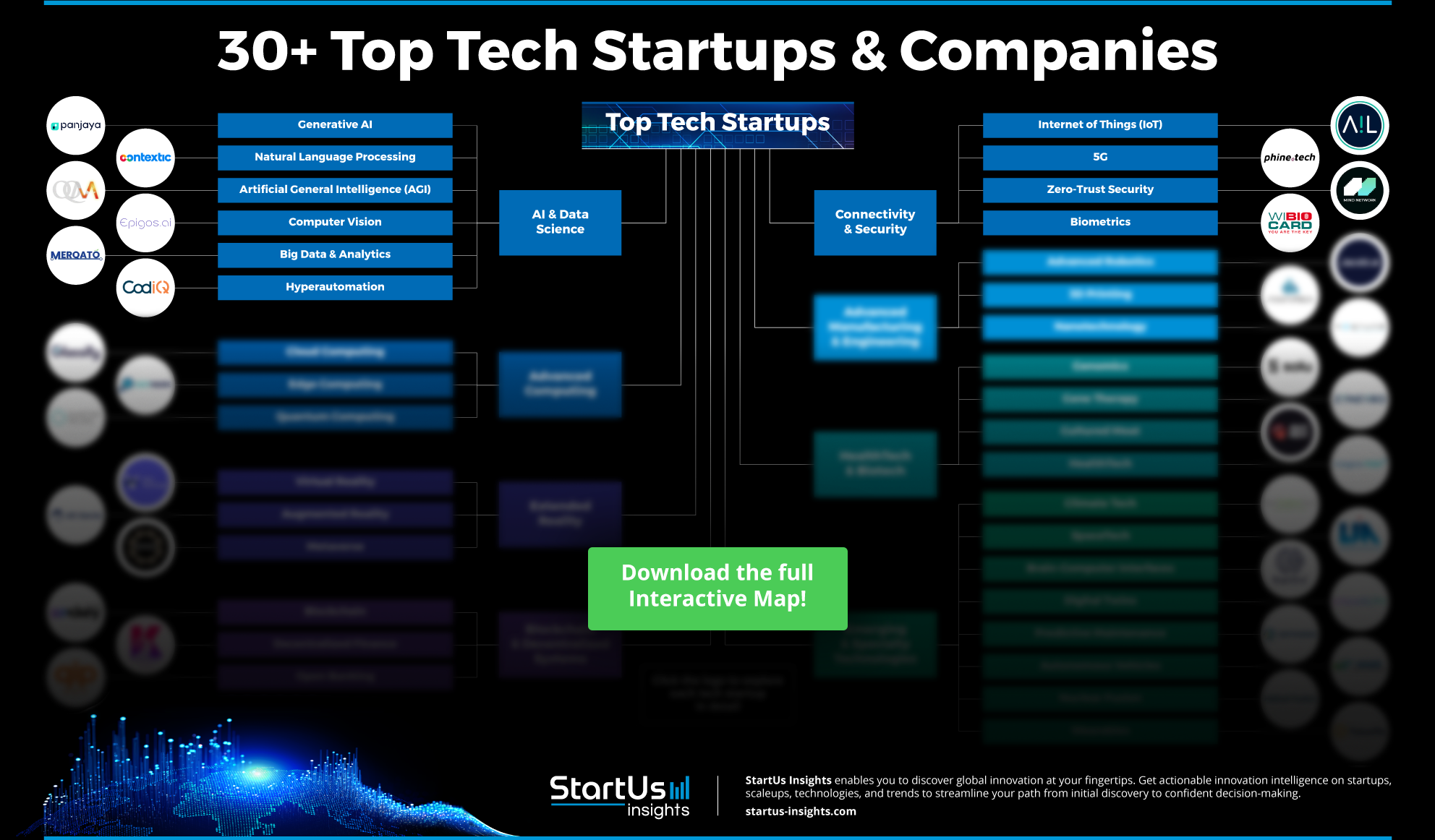
6. Personalized Treatments
Personalized treatments improve treatment efficacy, decrease cost, and minimize side effects. To advance this, AI analyzes the genetic, medical history, and lifestyle of a person to come up with personalized treatment plans. An example is customized rehabilitation programs for individual patients that feature real-time feedback, progress monitoring, and dynamic plans to improve recovery. The AI algorithms further study the patient’s historical data to identify risk factors within the treatment plan, suggest disease progression, and predict potential reactions to the treatment.
Dive Deeper:
- Noteworthy Example: Biofourmis specializes in personalized health analytics. They use AI to monitor physiological data collected from wearable devices, enabling early detection of health deterioration and personalized interventions.
- Financial Landscape: The average funding for startups using AI for personalized treatment is 11.8 million.
Startup to Watch: Kai Health
South Korean startup Kai Health offers an AI-powered, personalized fertility treatment. The company’s technology ecosystem, Vita Hub, consists of three key components. Vita Embryo uses AI to standardize embryo grading to automate analysis in reproductive technology. Vita Cryo then manages cryopreservation inventory with integrated tracking, efficient cloud management, and visualized control. Lastly, Vita Note handles data through a cloud-based IVF lab management platform. Together, these tools enable cost-effective and non-invasive streamlined fertility treatment processes.
7. Chronic Disease Management
Healthcare providers use AI to offer precise, proactive, personalized care for chronic disease management. To reduce errors and improve accuracy, they use AI to interpret medical images and other diagnostic tests. A few AI systems also act as virtual coaches and provide personalized recommendations for diet, exercise, and other lifestyle changes that can improve chronic disease outcomes.
Biosensors and wearables, powered by AI, enable continuous monitoring of vital signs and other health metrics like heart rate, blood pressure, glucose levels, and physical activity. AI systems also analyze these data and offer evidence-based recommendations to healthcare providers. It also integrates data from different platforms into one place and provides a more comprehensive view of patient health.
Dive Deeper:
- Noteworthy Example: CCS Medical has developed an AI tool called PropheSee for chronic care management, particularly focused on diabetes. Built in partnership with Accenture, the model pools patient data to generate personalized messages to keep patients on track with their diabetes treatment. The AI system is reported to be 90% accurate with a 90-day forecast of a patient’s likelihood to falter with treatment.
- Financial Landscape: The average funding for startups using AI for chronic disease management is USD 12.7 million.
Startup to Watch: Syai Health
Singapore-based startup Syai Health develops Syai Tag, a biosensor for real-time glucose monitoring. It combines AI and biosensing to offer a personalized diabetes management experience. The continuous glucose monitor (CGM) provides real-time readings to the companion smartphone app. The device is factory-calibrated, clinically proven for accuracy, and effective for up to 14 days. Syai Tag also supports data sharing with caregivers to deliver detailed glucose summaries, trend graphs, time-in-range metrics, average glucose data, and more for comprehensive management.
8. Health Records Management
AI-driven search algorithms let healthcare providers locate relevant patient information from vast amounts of data. The algorithm understands the context of searches and makes it easier for doctors to retrieve precise and relevant information. Further, natural language programming (NLP) tools transcribe and convert voice dictations or written notes from doctors into structured data in EHRs. This reduces errors and ensures that medical data is accurate. AI algorithms also automatically extract relevant data from forms, lab results, and medical images and input it directly into a patient’s health record.
Dive Deeper:
- Noteworthy Example: Oracle introduced an innovative electronic health record (EHR) system with advanced cloud and artificial intelligence capabilities. This new EHR is designed to simplify navigation and setup, allowing physicians to retrieve necessary information through voice queries. The system eliminates traditional menus and drop-down options, enabling doctors to devote more time to patient care rather than searching through records.
- Financial Landscape: The average funding for startups using AI for managing health records is USD 13 million.
Startup to Watch: Contrast
US-based startup Contrast offers ContrastHub, a suite of AI tools for improving EHR management in hospitals. The suite integrates with existing EHR systems using assistive AI while ensuring HIPAA compliance and third-party SOC 2 Type 2 certification. Its tools include ContrastInbox and ContrastScribe for the automatic generation of clinical documentation from natural patient conversations. Additionally, ContrastFlow improves task automation and ContrastEBM advances clinical decision-making with evidence-based medicine tools. Contrast ensures an efficient and patient-centered practice with its assistive AI products.
9. Telehealth
AI streamlines administrative processes in telehealth by automating appointment scheduling and patient follow-ups. It ensures timely follow-up by sending automated reminders for appointments, medication refills, or post-consultation care instructions. To minimize errors or omissions in medical records, AI accurately captures and stores all important information from consultations. To optimize telemedicine triage and remote patient monitoring (RPM), AI analyzes data collected on remote sensors, and wearable, or mobile health apps. The data is used to assess patient symptoms, prioritize care, and direct them to suitable levels of care.
Dive Deeper:
- Noteworthy Example: Teladoc Health offers a range of AI-powered services, including chronic disease management, mental health therapy, and dermatology. Their platform uses AI to personalize treatment plans, triage patients, and connect them with the right healthcare providers. They also employ AI-powered virtual care coaches for patients with chronic conditions, providing personalized guidance and educational resources.
- Financial Landscape: The average funding for startups using AI for telehealth is USD 7.1 million.
Startup to Watch: MedAi
UK-based startup MedAI provides an AI-driven telemedicine support platform to improve patient care. It analyzes patient data to connect individuals with the appropriate specialists based on their specific health needs. The intelligent health record platform securely stores patient information to ensure quick and easy access for healthcare providers. It also delivers personalized recommendations for diet, exercise, and lifestyle adjustments by analyzing patient data. Using predictive analytics, the platform identifies potential health risks before they escalate. Additionally, virtual assistants assist patients schedule appointments, refilling prescriptions, accessing medical information, and ensuring they follow medication instructions properly.
10. Fraud Detection
Machine learning spots unusual patterns in claim analysis such as excessive billing for certain services, multiple claims for the same service, or inconsistencies with the standard treatment protocol. By incorporating feedback loops from fraud investigators, AI assists in refining risk scoring, billing verification, patient and provider verification, and more. Additionally, AI-powered biometric technologies improve patient verification by data matching to reduce identity theft. Similarly, these solutions verify provider licenses, certifications, and credentials to ensure only qualified providers participate in the healthcare programs.
Dive Deeper:
- Noteworthy Example: Indian digital healthcare platform MediBuddy has introduced an AI-powered fraud detection system called Sherlock. This system uses artificial intelligence, machine learning, and data analytics to combat fraudulent claims in healthcare reimbursement. It performs real-time analysis to detect potential errors or fraud before they impact the system. and identifies issues like claim duplication, document tampering, and pricing discrepancies.
- Financial Landscape: The average funding for startups using AI for detecting fraud in the healthcare industry is USD 11.3 million.
Startup to Watch: Naviquis
US-based startup Naviquis offers a provider relationship management system (PRMS), which is a payment integrity solution. The solution uses AI and ML to deliver automated, real-time management. The functionalities of the platform include provider engagement, communication platform, education hub, and monitoring support. It is suitable for detecting and preventing healthcare fraud, waste, and abuse (FWA).
It analyzes medical claims from all providers to uncover specific ways in which FWA is perpetrated. This distinctive multi-faceted payment integrity method is applied after adjudication and before payment, which assists healthcare payers save millions of dollars. The payment integrity solution further streamlines medical claim review by using advanced data analysis techniques. It improves the client and member experience by optimizing overall efficiency and reducing costs.
Don’t Miss Out on the Latest Healthcare Innovations
Top investors like Techstars, Y Combinator, MassChallenge, Antler, and Google for Startups support startups focusing on AI applications in the healthcare industry. They provide crucial funding that drives innovation. This funding majorly spans seed, accelerator/incubator, early-stage VC/series A, pre-seed, and angel rounds. Whereas, the average funding per round stands at USD 8.2M million, supporting early-stage startups developing AI-powered solutions advancing healthcare.
Ready to leverage the latest healthcare technologies shaping the future? With StartUs Insights, you gain quick and easy access to over 4.7 million startups, scaleups, and tech companies, along with 20K+ emerging technologies and trends. Our AI-powered search and real-time database provide exclusive solutions that set you apart from the competition.
Industry giants like Samsung, Nestlé, and Magna trust our innovation intelligence tools to lead trends, optimize operations, and uncover new market opportunities. Benefit from our unmatched data, comprehensive industry views, and reliable insights to drive strategic decision-making. Get in touch to learn how our tailored discovery options can accelerate your innovation journey.
Discover All AI-led Healthcare Technologies & Startups!
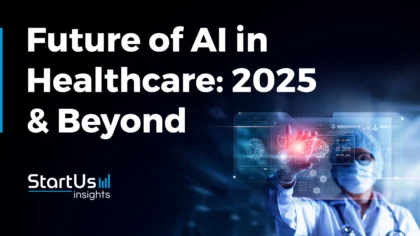
![AI in Healthcare: A Strategic Guide for Industry Leaders [2025-2030]](https://www.startus-insights.com/wp-content/uploads/2025/03/AI-in-Healthcare-SharedImg-StartUs-Insights-noresize-420x236.webp)
